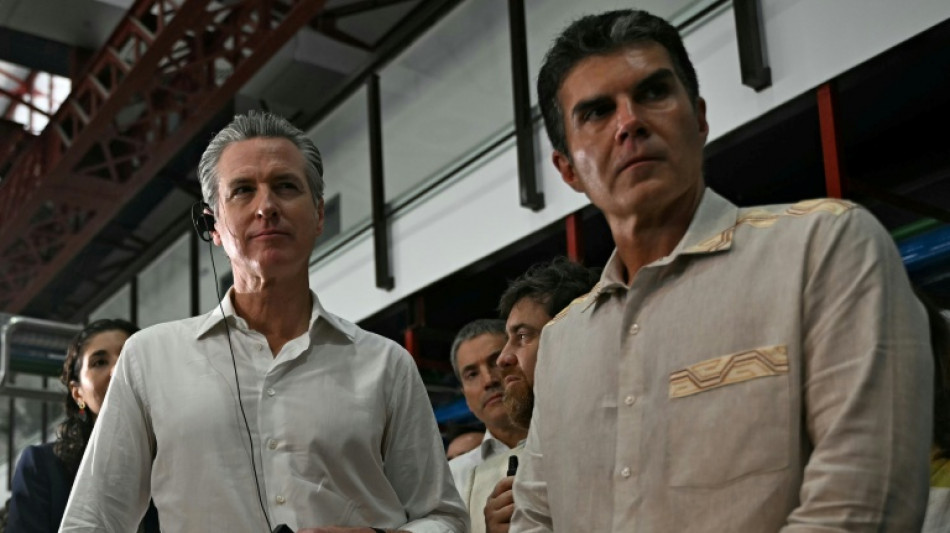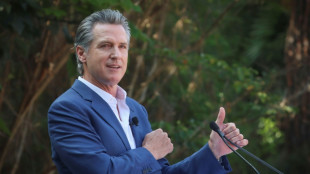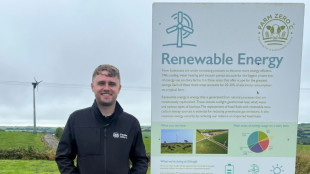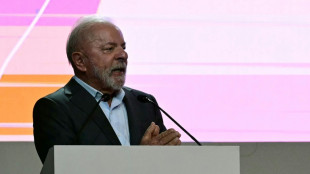
California governor Newsom slams Trump at COP30

With US President Donald Trump skipping the UN's climate summit in the Amazon, California Governor Gavin Newsom grabbed the spotlight at COP30 on Tuesday and took a swipe at the fossil fuel agenda of his political nemesis.
The well-coiffed Democrat -- seen as a potential 2028 presidential candidate -- slammed Trump for leaving the Paris climate accord and for "doubling down on stupid" through his pro-oil stance.
Newsom said a Democratic administration would rejoin the Paris Agreement "without hesitation."
"It's a moral commitment, it's an economic imperative, it's both -- and it's an abomination that he has twice, not once, pulled away from the accords," Newsom said in response to a question by AFP in Belem, the Brazilian Amazon city hosting the COP30 climate summit.
Newsom appeared alongside Helder Barbalho, the governor of Para state, of which Belem is the capital, at an event on the city's docks.
Between bites of cupuacu fruit and sips of acai juice, he touted California's green credentials, noting that the state now gets two-thirds of its electricity from renewable sources.
It was the first stop for the leader of the world's fourth largest economy, with a signing ceremony with the German state of Baden-Wurttemberg, and a press conference with the Brazilian's summit leadership among events to follow.
Trump withdrew the United States from the Paris climate accord upon returning to office in January and has sneered at the idea of human-caused planetary warming, calling it a "con job".
But Champa Patel, executive director for governments and policy at Climate Group, which runs the Under2 Coalition of global states and regions, said US states could still pursue the climate blueprints left by former president Joe Biden's administration, even if they are not part of the meeting's negotiations.
"The states have that roadmap, they can still follow it and keep to the spirit of Paris," Patel told AFP, adding it was important to signal solidarity.
"Even if national governments backslide, or if they undermine their own commitments, subnational governments, cities, states, regions, are really at the vanguard of implementation."
- State power -
"The president can't throw a switch and turn everything off -- that's now how our system works," added Nate Hultman, a former official in the Barack Obama and Biden administrations who now works as a researcher at the University of Maryland's Center for Global Sustainability.
A recent analysis by the group found that if leading states and cities enhance action -- and if a climate-friendly president is elected in 2028 -- US emissions could fall by the mid-50s in terms of a reduction in percentage points, approaching the 61-66 percent targeted by Biden's government.
Much of that stems from states' authority over energy and building policy, and cities' control of waste management, methane reduction, public transport, and more, Hultman told AFP.
The market-driven green shift remains a strong factor including in US states with climate-hostile leadership, including Texas, the country's renewable energy generation leader last year.
New Mexico's Michelle Lujan Grisham, another Democratic governor, is also at COP30. She governs a major fossil fuel-producing state but has pushed to expand renewables and curb methane emissions from the oil and gas sector.
Reflecting America's divided politics on climate, pro-oil and gas group Power the Future slammed the New Mexico leader for "packing her bags for another international climate junket".
Questions linger over the limits of state-level action. Trump's Republicans recently passed a law bringing an early end to clean energy tax credits enacted under Biden that is seen as a potentially crippling blow to the renewable sector.
Trump's government has also withdrawn funding for clean energy deployment and made permitting much more difficult, especially for wind projects, which the president has a strong personal distaste for.
And while state and regional coalitions can exert political pressure at climate summits they remain, for now, outside the official text-drafting process.
D.Ch. Nadeau--SMC


 London
London

 Manchester
Manchester
 Glasgow
Glasgow
 Dublin
Dublin
 Belfast
Belfast
 Washington
Washington
 Denver
Denver
 Atlanta
Atlanta
 Dallas
Dallas
 Houston Texas
Houston Texas
 New Orleans
New Orleans
 El Paso
El Paso
 Phoenix
Phoenix
 Los Angeles
Los Angeles



